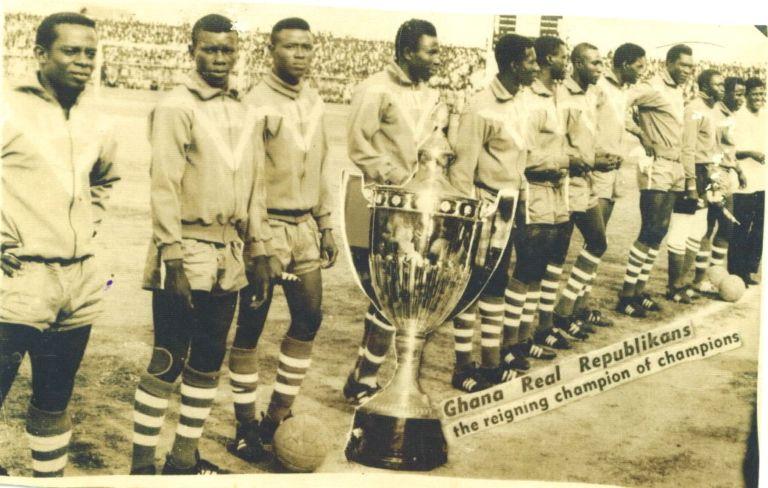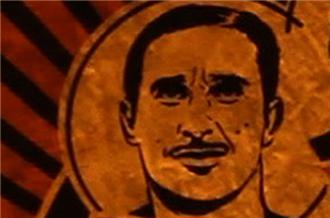
“Beyond the Pitch” is a riveting BBC World Service radio documentary that explores the close links between the “beautiful game” of football and the “dirty game” of politics in multiple African countries.
Produced by Farayi Mungazi and Penny Dale, the 50-minute feature aired on the eve of the 2017 Africa Cup of Nations (AFCON) in Gabon, which marks the 60th anniversary of the continent’s most prestigious sporting event.
The documentary opens with Nigeria’s boycott of AFCON 1996 in South Africa. The last-minute withdrawal of the Super Eagles came in retaliation for President Nelson Mandela’s scathing criticism of Nigerian dictator Sani Abacha’s regime, which in November 1995 had executed author Ken Saro Wiwa and eight more Ogoni environmental activists in a sham trial.
The next segment is captivating and among the most historically significant. It tells the story of how football helped Algeria’s struggle for independence from France through mesmerizing interviews with Mohamed and Khadidja Maouche. He was a young professional footballer in France in the late 1950s, but the newlyweds were also members of the National Liberation Front (FLN), the main Algerian liberation movement. The couple reveals how they secretly worked together to facilitate an exodus of Algerian-born footballers from their French clubs to play for the FLN “national” team. “No-one knew I was married to Maouche,” Khadidja says. “They would just be told a FLN activist wanted to speak to them. I would talk to them individually to say: ‘It’s an order, that’s it,’ and they all agreed.” In 1960 Mohamed Maouche eventually joined the FLN team, which played matches in front of large crowds in North Africa, the Middle East, East Asia, and Eastern Europe. “We were the first ambassadors of the revolution and the Algerian people,” he recalls with profound emotion half a century later.
Burundi’s current President Pierre Nkurunziza, a qualified football coach and owner of Hallelujah FC, is mentioned as a bridge to a terrific interview with Dr. Hikabwa Chipande, an historian and Michigan State University alumnus (PhD, 2015). Now a lecturer in African history at the University of Zambia, Chipande brings the BBC reporter through the archives in Lusaka where he conducted doctoral research on the history of Zambian football. As they look at sources documenting former president Kenneth Kaunda’s passion for and involvement in the game, Chipande points to a 1974 photograph of Kaunda serving food to the national team—quite an endearing, populist image. Mungazi then travels to Luanshya, on the Copperbelt, to talk football and politics with Dickson Makwaza, one of the players served by Kaunda in 1974, and with 91-year-old Tom Mtine, a legendary football administrator.
In the second half of the documentary we leap ahead to AFCON 2010 in Angola. The Togo national team bus was targeted by armed separatists from the enclave of Cabinda at the border with the Republic of Congo: “probably the most dramatic moment ‘off the pitch’ in the history of the Africa Cup of Nations,” Mungazi says. The armed attack killed two men and wounded several others: “one of the worst experiences I’ve had in my life,” said Togolese striker and English Premier League veteran, Emmanuel Adebayor.
The last time Uganda qualified for AFCON was in 1978 when the infamous Idi Amin was still in power. A local academic and former national team players explain how Amin, a keen boxer himself, bankrolled sports during his dictatorship (1971-79) to boost nationalism and also as a weapon of mass distraction. But we also hear of the traumatic experiences of John Ntensibe and Mama Baker. The former was imprisoned and forced to load bodies onto trucks after scoring the winning goal for Express FC against the army team, Simba, while Baker, a devoted Express supporter, was arrested twice for little more than being Uganda’s biggest soccer fan.
Fast forward again to the 21st century: we hear about George Weah, Africa’s only World Player of the Year (1995), who launched a career in politics in Liberia after retiring from the game. Weah lost a presidential election in 2004 (to future Nobel Peace laureate Ellen Sirleaf Johnson), but recently won a Senate seat and may run again for his country’s highest office.
The final chapter in the story of the links between politics and football focuses on Ghana. There, top clubs Accra Hearts of Oak and Kumasi Asante Kotoko have long been entangled in party politics and presidential contests. Veteran Ghanaian reporter Kwabena Yeboah also describes the emergence of Real Republikans, a super club of the 1960s closely connected to President Kwame Nkrumah. Subsequent regimes in Ghana, it is noted, used the men’s national team, the Black Stars, to strengthen their popularity and “perpetuate their reign.”
As a scholar who has been writing about African football history, culture, and politics for a long time, I found Farayi Mungazi and Penny Dale’s “Beyond the Pitch” documentary to be finely researched and evocatively presented through African voices. The producers did well to carefully bring out the game’s contradictory capacity to be a force for empowerment and disempowerment. What a great way to get ready for the upcoming 2017 AFCON in Gabon. And what a wonderful resource for teaching and research.
Click here to listen and download the podcast version of the documentary.
Tag: FLN
 On April 13, 1958, in the midst of Algeria’s war of independence, ten Algerian professional players surreptitiously left France for Tunis. Among them was 21-year-old St. Etienne forward Rachid Mekhloufi, the central character in the second installment of the “Football Rebels” documentary on Al Jazeera.
On April 13, 1958, in the midst of Algeria’s war of independence, ten Algerian professional players surreptitiously left France for Tunis. Among them was 21-year-old St. Etienne forward Rachid Mekhloufi, the central character in the second installment of the “Football Rebels” documentary on Al Jazeera.
Through evocative interviews, archival footage, and on-camera visits to important historical sites, the documentary crafts a lively, humanistic, and emotional account of the FLN team. In tours of North Africa, the Middle East, Eastern Europe, and East Asia between 1958 and 1961, the Algerians compiled a record of sixty-five wins, thirteen draws, and thirteen losses. Playing entertaining, attacking football, the FLN side heightened international awareness of the Algerian fight against French colonialism and garnered broad support for the FLN, at home and abroad. The Algerians even sought to become part of FIFA, but the world body rejected the application.
In a highpoint of the film, Mekhloufi remembers how wearing a national uniform, flying a national flag, and singing “Kassaman” (We Pledge)–which later became independent Algeria’s national anthem–in a stadium full of ordinary fans as well as guerrillas instilled pride in him and made an imagined “Algeria” real. “What I got out of that FLN team,” says Mekhloufi in the closing moments of the film, “couldn’t have been bought with all the gold in the world.” Indeed, by putting patriotism before profit and crystallizing an emerging national identity, the FLN footballers propelled the Algerian people’s quest for equality and freedom. What an incredibly powerful story about sport and human rights. Watch, listen, and learn.
For more details about this revolutionary football team, see my post “Death of a Striker, Fighter, and Socialist” on Ben Bella and my book African Soccerscapes. Other helpful sources are Ian Hawkey’s Feet of the Chameleon, Laurent Dubois’s Soccer Empire, and, for French readers, R. Saadallah and D. Benfars’s La Glorieuse Équipe du FLN and Michel Nait-Challal’s Dribbleurs de l’indépendance.
Drogba: The Peacemaker
Omdurman, Sudan, October 8, 2005: moments after Ivory Coast secured qualification to the World Cup finals for the first time, Didier Drogba extemporaneously transformed himself into a peacemaker. His country at the time was torn apart by a civil war between the Muslim-dominated rebel-held north and the mainly Christian south controlled by President Laurent Gbagbo’s government. Surrounded by joyous teammates in the dressing room, Drogba took the microphone and knelt in front of the television cameras. “We have proved that all Ivorians can live together,” he said, “and we can unite with the same objectives. Please, put down your weapons!”
The dressing room scene provides the emotional spark and narrative hook in “Didier Drogba and the Ivorian Civil War,” the riveting first episode of “Football Rebels,” a five-part documentary that began this week on Al Jazeera English. (Watch it here.) “It was just something I did instinctively,” the Ivorian striker would later tell Alex Hayes of The Telegraph in a 2007 interview. “All the players hated what was happening to our country, and reaching the World Cup was the perfect emotional wave on which to ride.”
The Al Jazeera documentary film reveals the little-known story of how Drogba played a key role in getting the national team, The Elephants, to play a 2008 African Nations Cup qualifier against Madagascar in Bouaké in the rebel heartland. Ivory Coast won 3-0, triggering a much needed sense of patriotic pride, national unity, and peace. (Highlights below.)
Presented by former Manchester United star Eric Cantona, “Football Rebels” focuses on players “whose social conscience led them to use their fame and influence to challenge unjust regimes, join opposition movements and lead the fight for democracy and human rights in their countries.” The next episode features another brilliant African player: Rachid Mekhloufi, who left the 1958 French World Cup team to join the FLN team aiding the cause of Algerian independence.